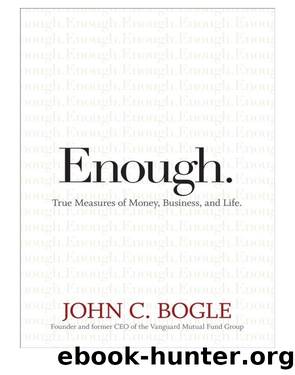Enough by John C. Bogle

Author:John C. Bogle
Language: eng
Format: epub
Publisher: John Wiley & Sons, Ltd.
Published: 2010-05-10T16:00:00+00:00
Principals and Principles
Returning professional conduct to a more important role in business affairs will be no easy task. One avenue to pursue, curiously enough, was suggested by a mailing that arrived on my desk with a typographical error that I just couldnât ignore. Sent out by the Center for Corporate Excellence to announce that General Electric would receive its Long-Term Excellence in Corporate Governance award, the flyer quoted GE president Jeffrey Immelt on the importance of âsound principals of corporate governance.â
Clearly, the quotation should have read principles, not principals. But as I thought about the error, it seemed almost prophetic. After all, no matter how strong the ethical principles of the world of business may be, of what use are they without ethical principals to honor them? Corporate America is in dire need of more leaders who will assume the responsibility of assuring that these ethical principles permeate and dominate the culture of our corporate world.
We can all agree, Iâm sure, on a basic set of ethical principles that should guide businesses and their leaders toward traditional professional standards. Indeed, virtually all of our large publicly held corporations already have ethical codes, published for all to see, paying lip service to high ideals. Yet we have also witnessed far too many examples in which these standards have been ignored by the very managements that brag about them, in order to meet ambitiousâoften overly ambitiousâgoals for growth in corporate revenues and earnings.
Our corporate directors also pay lip service to their duty to responsibly represent the shareholders of the companies whose proxies they vote. How could they say otherwise? But preserving, protecting, and defending the corporationâs resources with the interests of its owners as the highest priority seems the exception rather than the rule.While the fact is that the CEO is an employeeâalbeit the senior employeeâof the corporation, responsible, through the board of directors, to the owners, rare are the CEOs who see themselves in those terms. Rather, the paradigm is those imperial CEOs who view themselves as solely responsible for the creation of shareholder valueâforgetting the immense contribution made by all those millions of employees who commit themselves to the task of building corporate value every day, and worse, are paid as if their contribution were small.
We see corporations preach the so-called balanced scorecard that calls for fair dealing with the corporationâs other constituenciesâcustomers, employees, suppliers, the local community, government, and the public. But the newspapers are full, every day it seems, of stories of companies that have gone in exactly the opposite direction. And how about the integrity of the firmâs financial statements, let alone the true independence of the independent auditor who attests to their conformity with generally accepted accounting principles? Small wonder that the engineering wonder of our age is financial engineering.
Am I arguing that our business principals of today are less ethical than their predecessors? No, not necessarily. But I am arguing that our business principles have been compromised. It wasnât so many decades ago that the
Download
This site does not store any files on its server. We only index and link to content provided by other sites. Please contact the content providers to delete copyright contents if any and email us, we'll remove relevant links or contents immediately.
Machine Learning at Scale with H2O by Gregory Keys | David Whiting(4312)
Never by Ken Follett(3954)
Harry Potter and the Goblet Of Fire by J.K. Rowling(3856)
Fairy Tale by Stephen King(3393)
Unfinished: A Memoir by Priyanka Chopra Jonas(3388)
The Man Who Died Twice by Richard Osman(3077)
Will by Will Smith(2919)
It Starts With Us (It Ends with Us #2) by Colleen Hoover(2367)
Rationality by Steven Pinker(2363)
Can't Hurt Me: Master Your Mind and Defy the Odds - Clean Edition by David Goggins(2339)
The Dark Hours by Michael Connelly(2307)
The Storyteller by Dave Grohl(2234)
Friends, Lovers, and the Big Terrible Thing by Matthew Perry(2230)
The Dawn of Everything: A New History of Humanity by David Graeber & David Wengrow(2208)
The Becoming by Nora Roberts(2201)
The Stranger in the Lifeboat by Mitch Albom(2120)
Cloud Cuckoo Land by Anthony Doerr(2110)
Love on the Brain by Ali Hazelwood(2074)
Einstein: His Life and Universe by Walter Isaacson(2021)
